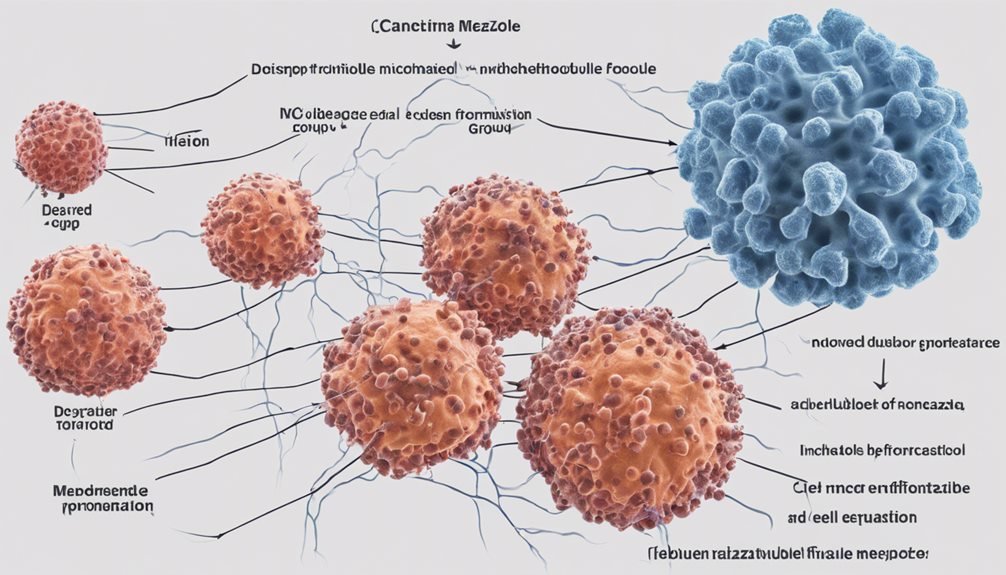In the realm of cancer therapeutics, exploring the mechanisms behind Mebendazole's anti-cancer properties unveils intriguing insights into its potential applications beyond its original design. By uncovering how this repurposed drug disrupts cancer cell growth through intricate pathways, researchers have opened doors to novel treatment strategies with far-reaching implications. Its multifaceted approach to inhibiting tumor progression and enhancing treatment outcomes beckons for a closer examination of its efficacy and future prospects in the oncology landscape.
Key Takeaways
- Mebendazole disrupts microtubule function, inducing cancer cell death.
- It inhibits angiogenesis, crucial for tumor growth and metastasis.
- Enhances immune response and regulates apoptosis pathways.
- Demonstrates efficacy in combination therapy for cancer treatment.
- Clinical trials evaluate mebendazole's effectiveness in cancer treatment.
Mebendazole's History in Cancer Research
In the realm of cancer research, Mebendazole's journey has been one of intrigue and promise. With its historical significance dating back to the 1970s as an anti-parasitic drug, the shift towards exploring its anti-cancer properties has unveiled exciting prospects. The clinical applications of Mebendazole in cancer treatment have sparked interest due to its potential to target various types of cancer cells.
Historically, Mebendazole, known for its safety profile and low cost, has shown promise in inhibiting cancer cell growth both in vitro and in vivo. Researchers have delved into its mechanisms of action, uncovering its ability to disrupt microtubule function, leading to cell cycle arrest and apoptosis in cancer cells. This unique mechanism sets Mebendazole apart from traditional chemotherapeutic agents, making it a compelling candidate for further exploration in cancer treatment.
The historical significance and emerging clinical applications of Mebendazole in cancer research highlight the importance of continued studies to unlock its full potential in serving others battling this complex disease.
Mechanistic Insights of Mebendazole
Through detailed research and experimentation, scientists have unraveled the mechanistic insights of Mebendazole, shedding light on its intriguing anti-cancer properties. Mebendazole, known for its traditional use as an anthelmintic, has emerged as a promising candidate in cancer therapy due to its therapeutic potential. Studies have shown that Mebendazole exerts its anti-cancer effects by targeting specific molecular pathways within cancer cells.
One of the key mechanisms of Mebendazole lies in its ability to disrupt microtubule dynamics, crucial for cell division. By binding to tubulin proteins, Mebendazole interferes with spindle formation, leading to cell cycle arrest and ultimately inducing cancer cell death.
Additionally, Mebendazole has been found to inhibit angiogenesis, a process essential for tumor growth and metastasis.
Understanding the molecular targets of Mebendazole has paved the way for exploring its potential in combination therapies and personalized medicine approaches. This knowledge not only enhances our understanding of Mebendazole's anti-cancer properties but also opens up new avenues for developing effective treatments for various types of cancer.
Antiproliferative Effects on Cancer Cells

By targeting crucial cellular processes, Mebendazole demonstrates potent antiproliferative effects on cancer cells. Mebendazole interferes with microtubule dynamics, disrupting mitosis and inducing cell cycle arrest, ultimately leading to cancer cell death. This mechanism has shown efficacy across various cancer types, highlighting Mebendazole's broad therapeutic applications in oncology.
Studies have elucidated that Mebendazole inhibits tubulin polymerization, essential for proper microtubule function during cell division. By binding to beta-tubulin subunits, Mebendazole destabilizes microtubules, preventing their proper assembly and function. This disruption halts cell cycle progression at metaphase, triggering apoptosis in cancer cells.
Moreover, Mebendazole's antiproliferative effects extend beyond microtubule disruption. The drug has been shown to modulate cellular pathways involved in proliferation and survival, further enhancing its anticancer properties. By targeting these critical pathways, Mebendazole presents a promising avenue for cancer treatment with potential implications for combination therapies in the future.
Angiogenesis Inhibition Mechanisms
Mebendazole's efficacy in combating cancer extends to its ability to inhibit angiogenesis, a critical process for tumor growth and metastasis. By targeting the formation of new blood vessels that provide nutrients to tumors, mebendazole disrupts the vascular network essential for tumor expansion and progression. This vascular targeting effect impedes the tumor's ability to access the oxygen and nutrients needed for sustained growth, ultimately hindering its development.
Studies have shown that mebendazole's angiogenesis inhibition mechanisms contribute significantly to its anti-cancer properties. By disrupting the delicate balance of pro-angiogenic and anti-angiogenic factors in the tumor microenvironment, mebendazole effectively suppresses the formation of new blood vessels necessary for tumor growth.
The ability of mebendazole to impede angiogenesis represents a promising strategy in combating cancer progression. By specifically targeting the vascular network that fuels tumor growth, mebendazole offers a novel approach to inhibiting tumor angiogenesis and ultimately controlling tumor development.
Apoptosis Induction Pathways

Inducing apoptosis in cancer cells is a crucial mechanism through which mebendazole exerts its anti-cancer effects. Mebendazole has been found to regulate apoptosis through various signaling pathways.
One significant pathway is the mitochondrial pathway, where mebendazole can disrupt the mitochondrial membrane potential, leading to the release of pro-apoptotic factors like cytochrome c. This triggers a caspase cascade, ultimately resulting in cell death.
Additionally, mebendazole can activate death receptors on the cell surface, initiating the extrinsic pathway of apoptosis. By binding to these receptors, mebendazole can activate caspases directly, bypassing the need for mitochondrial involvement.
Furthermore, mebendazole has been shown to modulate various proteins involved in apoptosis regulation, such as Bcl-2 family members. By influencing the balance between pro-apoptotic and anti-apoptotic proteins, mebendazole can tilt the scale towards cell death.
Understanding how mebendazole impacts apoptosis regulation and signaling pathways is crucial for harnessing its full potential as an anti-cancer agent.
Impact on Cell Cycle Arrest
Mebendazole demonstrates a profound impact on cell cycle regulation in cancer cells. Research indicates that mebendazole interferes with the cell cycle progression of cancer cells, leading to cell cycle arrest. By targeting tubulin polymerization, mebendazole disrupts the normal functioning of microtubules essential for cell division, consequently halting the cell cycle at various checkpoints. This disruption ultimately prevents cancer cells from proliferating uncontrollably.
The ability of mebendazole to induce cell cycle arrest has significant therapeutic implications. By impeding the cell cycle, mebendazole restricts the growth and spread of cancer cells, potentially enhancing the effectiveness of other anti-cancer treatments.
Moreover, this mechanism of action makes mebendazole a promising candidate for combination therapy approaches, where it can synergize with other drugs to target cancer cells more comprehensively.
Understanding how mebendazole impacts cell cycle regulation in cancer cells provides valuable insights for developing targeted anti-cancer therapies. Further research in this area may unlock new strategies for combating cancer through precise manipulation of the cell cycle.
Immune Modulation Properties

Research has shed light on the immune modulation properties of mebendazole, showcasing its potential to influence the body's immune response against cancer. Mebendazole's immunomodulation benefits are particularly intriguing as they can impact the tumor microenvironment, altering the conditions in which cancer cells thrive.
To better understand how mebendazole influences the immune system in the context of cancer treatment, let's delve into the following table:
| Immune Modulation Properties of Mebendazole | Effects on Cancer Treatment |
|---|---|
| Increases T-cell activation | Enhances immune response against cancer cells |
| Modulates cytokine production | Regulates inflammation in the tumor microenvironment |
| Reduces regulatory T-cell activity | Helps prevent immune suppression by cancer cells |
| Enhances natural killer cell function | Improves cancer cell killing capabilities |
Metastasis Suppression Potential
With its potential to inhibit the spread of cancer cells to distant sites in the body, mebendazole's metastasis suppression capabilities have garnered attention in cancer research and treatment. Studies have shown that mebendazole possesses promising abilities in preventing the metastasis of tumors to other parts of the body. Here are some key points regarding mebendazole's metastasis suppression potential:
- Mebendazole has demonstrated metastasis inhibition in various preclinical cancer models.
- It works by targeting microtubule dynamics, disrupting processes crucial for cancer cell migration and invasion.
- Studies suggest that mebendazole may inhibit the formation of new blood vessels, crucial for tumor spread.
- By modulating cell signaling pathways involved in metastasis, mebendazole shows promise in tumor spread prevention.
- Research indicates that mebendazole's anti-angiogenic properties contribute to its ability to suppress metastasis.
These findings highlight the potential of mebendazole in targeting metastasis, offering new insights into its role in combating cancer progression.
Combination Therapy Synergies

When considering the effectiveness of cancer treatments, exploring the synergistic potential of mebendazole in combination therapies becomes paramount. Drug interactions play a crucial role in determining the success of these combinations. Mebendazole has shown promising results in enhancing the efficacy of other anticancer drugs when used in combination. Understanding how mebendazole interacts with different drugs can lead to improved treatment outcomes by maximizing their combined effects.
Moreover, resistance mechanisms present a challenge in cancer treatment. By incorporating mebendazole into combination therapies, the risk of developing resistance to a single drug may be mitigated. Mebendazole has demonstrated the ability to overcome resistance mechanisms in certain cancers, making it a valuable component in combination treatments.
Exploring the intricate dynamics of drug interactions and resistance mechanisms is essential when designing combination therapies involving mebendazole. By leveraging the synergies between mebendazole and other anticancer drugs, healthcare providers can offer more effective treatment options to patients battling cancer.
Clinical Trials and Research Outcomes
To delve into the realm of clinical trials and research outcomes surrounding mebendazole's anti-cancer potential, a comprehensive analysis of its efficacy in real-world settings is imperative. When examining patient responses and dosage optimization, several key insights emerge:
- Patient Responses: Observing how patients with different types of cancer respond to mebendazole treatment provides valuable data on its effectiveness.
- Dosage Optimization: Determining the ideal dosage of mebendazole for maximum anti-cancer benefits is crucial for achieving optimal outcomes.
- Clinical Trial Results: Analyzing the results of various clinical trials can offer valuable insights into mebendazole's potential as an anti-cancer agent.
- Long-Term Follow-Up Studies: Conducting long-term follow-up studies on patients who've undergone mebendazole treatment can shed light on its efficacy over time.
- Comparative Studies: Comparing mebendazole with other conventional cancer treatments in clinical trials can help assess its potential advantages and drawbacks.
Safety Profile and Side Effects

For a thorough examination of mebendazole's potential as an anti-cancer agent, a critical aspect to consider is its safety profile and associated side effects. Mebendazole is generally well-tolerated in most individuals, with common adverse reactions being mild and transient, including gastrointestinal symptoms like nausea, vomiting, and diarrhea.
However, in higher doses used for cancer treatment, there's a need for careful toxicity evaluation. Studies have shown that mebendazole exhibits low toxicity levels in humans, but caution is advised due to potential liver toxicity at high doses. Monitoring liver function during treatment is recommended to ensure patient safety.
Additionally, mebendazole's impact on the bone marrow should be considered, as it could lead to myelosuppression in some cases. Understanding and managing these potential side effects are crucial in maximizing the benefits of mebendazole as an anti-cancer agent.
Future Perspectives and Implications
Having thoroughly examined mebendazole's safety profile and associated side effects, the focus now shifts towards exploring its future perspectives and implications in the realm of cancer treatment. Mebendazole, initially known for its anthelmintic properties, has shown promising potential as an anti-cancer agent through various research studies. Moving forward, here are some key points to consider:
- Therapeutic Potential: Further clinical trials are essential to determine the full extent of mebendazole's efficacy against different types of cancer.
- Drug Repurposing: The concept of repurposing existing drugs like mebendazole for cancer treatment can lead to cost-effective and time-efficient solutions.
- Combination Therapy: Investigating mebendazole in combination with other standard cancer treatments could enhance its effectiveness.
- Biomarker Research: Identifying specific biomarkers that predict a positive response to mebendazole treatment can aid in personalized cancer therapy.
- Global Access: Addressing accessibility issues to ensure that the therapeutic benefits of mebendazole reach underserved populations worldwide.
Frequently Asked Questions
Can Mebendazole Be Used as a Preventative Measure for Cancer?
Yes, Mebendazole shows promise as a cancer prevention tool. Studies suggest its efficacy in suppressing cancer growth. While more research is needed to confirm its preventive capabilities, early findings are encouraging.
Mebendazole's potential as a preventative measure is an exciting avenue for further exploration in cancer prevention strategies. Stay informed about ongoing research to understand the full scope of Mebendazole's role in cancer prevention.
Are There Any Known Drug Interactions With Mebendazole?
Yes, there are potential risks of drug interactions with mebendazole.
It's crucial to consult your healthcare provider to discuss any medications you're currently taking. They can evaluate if there are any concerns and recommend appropriate dosage adjustments if needed.
How Does Mebendazole Affect Non-Cancerous Cells in the Body?
So, when it comes to how mebendazole affects non-cancerous cells in your body, it's like this: The drug can lead to cellular toxicity in these cells, impacting their normal functioning.
This can trigger an immune response as your body tries to combat the effects.
It's crucial to keep an eye on any potential side effects and consult with your healthcare provider for guidance on managing them effectively.
Is Mebendazole Effective Against All Types of Cancer?
Yes, mebendazole shows promise in clinical trials against various types of cancer due to its anti-cancer properties. However, some cancer cells may develop resistance mechanisms over time.
While research is ongoing, current evidence suggests that mebendazole's effectiveness can vary depending on the cancer type.
Consult with your healthcare provider to explore its potential benefits for your specific condition and discuss the latest findings from clinical studies.
Are There Any Dietary Restrictions When Taking Mebendazole for Cancer Treatment?
When taking mebendazole for cancer treatment, nutrition considerations play a crucial role. While there aren't specific dietary restrictions, it's advisable to maintain a balanced diet rich in fruits, vegetables, and whole grains to support overall health during treatment.
Some foods may interact with mebendazole, so it's essential to consult with your healthcare provider or a registered dietitian to ensure your diet complements your treatment plan effectively.
Conclusion
In conclusion, Mebendazole acts as a "microtubule disruptor," dismantling cancer cells like a skilled demolition crew tearing down a building. Its multifaceted mechanisms, from cell cycle arrest to apoptosis induction, showcase its potential as a powerful anti-cancer agent. With ongoing clinical trials and promising research outcomes, Mebendazole's journey from an antiparasitic drug to a cancer treatment highlight its significance in the ever-evolving landscape of oncology.





